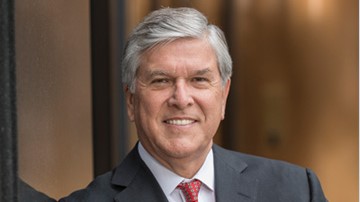NAB’s Gordon Smith: 9 Lessons for Broadcasters
In his last state of the industry address, Smith stressed “NAB should never register Republican or Democrat, but as human, local and American.”

WASHINGTON, D.C.—In his final State of the Industry address before leaving the association, president and CEO of the National Association of Broadcasters Gordon Smith laid out nine lessons for the industry that started with the importance of negotiating and included the admonition that the “NAB should never register Republican or Democrat, but as human, local and American. We uphold and defend American values, such as factual journalism and the First Amendment. Neither party satisfies 100% of our issues. We need friends on both sides of the aisle.”
At the start of the address, Smith said “while this is not how I had hoped to share my final state of the industry address with all of you, know that we are building towards a strong NAB Show in April, and I look forward to seeing all of you there where we can continue focusing on building a thriving and vibrant industry.”
In the speech Smith stressed that “there never been a more important time to be a broadcaster… in the past 20 months, perhaps more than any other time that I can recall, your role has been invaluable. You have been there for your communities… keeping them informed, connected and safe during this time of uncertainty. And your advocacy team at NAB has been committed to ensuring local stations have the support you need to carry out your vital mission of serving your communities during this critical time.”
To build on the NAB’s successes in recent years he also highlighted nine lessons, beginning with the importance of never being afraid to negotiate.
“President John F. Kennedy once said, `Let us never negotiate out of fear. But let us never fear to negotiate.’ Negotiating is important -- it’s engagement. If you’re going to lose something, get something. This has been our winning strategy behind the performance tax issue. Our engagement on the Hill is to talk, negotiate and deal to be in the game -- stopping legislation that we deem harmful to our listeners and viewers, and shaping other legislation to advance and protect the interests of broadcasters.”
He also stressed the importance of being bipartisan by saying “NAB should never register Republican or Democrat” and that the NAB needed to “prioritize our issues. Focus on likely outcomes. When I first came here, I was handed a book of legislative issues that was about 50 pages long. I was asked what I thought about the book. I said I thought it was all very interesting, but you’re not telling me what’s important and what isn’t. There were probably only three main issues. My point is to prioritize – be a rifle, not a shotgun.”
Other lessons included the importance of investing in the future with “new technologies, such as Next Gen TV and hybrid radio” and the importance of being an advocate for local broadcasting.
The professional video industry's #1 source for news, trends and product and tech information. Sign up below.
“No matter how many conflicting interests we have (cable, satellite, terrestrial vs. streaming) NAB must always speak for free over-the-air, local broadcasting,” he said. “If NAB doesn’t, nobody else will.”
“Before you take a punch, anticipate the counterpunch,” he listed as his ninth lesson. “This will tell you whether it’s worth it. Some things have to ripen, and you want to calibrate your punch when it’s most impactful.”
The full address is available here along with a list of the winners of the coveted Marconi Radio Awards.
George Winslow is the senior content producer for TV Tech. He has written about the television, media and technology industries for nearly 30 years for such publications as Broadcasting & Cable, Multichannel News and TV Tech. Over the years, he has edited a number of magazines, including Multichannel News International and World Screen, and moderated panels at such major industry events as NAB and MIP TV. He has published two books and dozens of encyclopedia articles on such subjects as the media, New York City history and economics.

